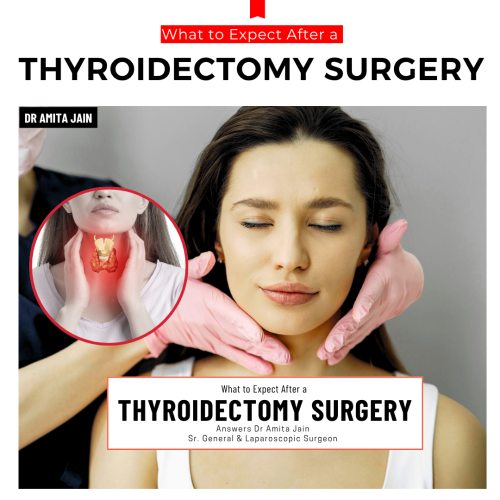Thyroidectomy is a common surgical procedure performed to treat various thyroid disorders such as thyroid nodules, goiter, hyperthyroidism, or thyroid cancer. While the thought of undergoing surgery on such a vital gland can be daunting, understanding what happens after the operation helps patients prepare both mentally and physically for recovery.
The post-thyroidectomy phase is an important period that focuses on healing, hormone balance, and monitoring for any potential complications. Here’s a detailed overview of what you can expect after a thyroidectomy surgery, as explained by Dr Amita Jain, who is a senior general and laparoscopic surgeon and one of the leading and most experienced thyroid surgeons in India.
What is a Thyroidectomy?
A thyroidectomy is a surgical procedure in which all or part of the thyroid gland—located at the base of the neck—is removed. The thyroid is responsible for producing hormones that regulate metabolism, energy levels, heart rate, and temperature control. There are mainly two types of thyroidectomy:
Total Thyroidectomy – Removal of the entire thyroid gland, often recommended for thyroid cancer or large goitres.
Partial (Hemi) Thyroidectomy – Removal of one lobe of the thyroid, typically performed when nodules or cysts are confined to one side.
The surgery is usually performed under general anaesthesia and takes about one to two hours, depending on the complexity.
Immediately After Surgery
After surgery, patients are usually moved to a recovery room where vital signs are closely monitored. It’s common to feel mild pain or tightness in the neck area, as well as some hoarseness or difficulty swallowing. These symptoms are temporary and usually improve within a few days.
Common post-surgery experiences include:
- Neck discomfort: Mild soreness, swelling, or a pulling sensation around the incision site.
- Hoarseness or weak voice: Caused by temporary irritation or swelling near the vocal cords.
- Drainage tube (if placed): In some cases, a small drain is inserted to prevent fluid accumulation, which is typically removed within 24–48 hours.
Most patients are able to start walking and resume light activities within a day after surgery. Hospital stays typically range from one to two days unless complications arise.
Recovery at Home
Once discharged, recovery continues at home. The incision area should be kept clean and dry, and heavy lifting or strenuous exercise should be avoided for about two weeks. Stitches or surgical tape may dissolve on their own, and the scar usually fades over time with proper care. Your doctor will likely prescribe:
Pain relievers: To ease discomfort.
Calcium or vitamin D supplements: Sometimes needed if the parathyroid glands (which regulate calcium levels) are temporarily affected.
Thyroid hormone replacement: If the entire thyroid has been removed, lifelong thyroid hormone tablets (levothyroxine) will be necessary to maintain normal metabolism and prevent hypothyroidism.
Monitoring Hormone Levels
After thyroidectomy, blood tests are done to monitor thyroid hormone (T3, T4) and TSH (thyroid-stimulating hormone) levels. It may take a few weeks to find the right dosage of thyroid replacement medication. Regular follow-ups are essential during this period to ensure hormonal balance and prevent symptoms such as fatigue, weight changes, or mood fluctuations.
For patients who had thyroid cancer, additional treatments such as radioactive iodine therapy may be recommended to destroy any remaining thyroid tissue or cancer cells.
Possible Complications (Though Rare)
While thyroidectomy is generally safe, a few potential complications can occur:
- Hypocalcemia: Tingling or numbness in fingers and around the mouth due to low calcium levels.
- Voice changes: Usually temporary but occasionally permanent if the vocal cord nerve is affected.
- Bleeding or infection: Rare but possible, requiring prompt medical attention.
Early recognition and treatment of these issues help ensure a smooth recovery.
Long-Term Outlook
Most patients recover fully within two to three weeks and can return to normal activities soon after. With proper medication and regular monitoring, individuals who’ve had their thyroid removed can lead completely normal and healthy lives.
The surgical scar generally becomes less noticeable over time, and advances in minimally invasive techniques have further improved cosmetic outcomes.
A thyroidectomy can be a life-improving and, in some cases, lifesaving procedure. Understanding what to expect after the surgery—ranging from short-term discomfort to long-term hormone management—helps reduce anxiety and supports a smoother recovery journey. With the right post-operative care, medical guidance, and consistent follow-up, most patients regain their health, energy, and confidence within weeks of the procedure.

Dr Amita Jain, one of the most experienced General and Laparoscopic Surgeons in Delhi, is widely recognised for her expertise in hernia, piles, gallbladder, fissure, and fistula surgeries. With an outstanding career spanning over 29 years, Dr Amita Jain has earned her place among the top General and Laparoscopic surgeons in Delhi and India, known for her precision, compassion, and consistent surgical excellence. She was the Professor of Surgery at the Army College of Medical Sciences and Base Hospital, Delhi Cantt. In 1994, she was commissioned as a surgeon under the United Nations Mission in Congo.
Dr Amita Jain currently serves as the Head of Department, Laparoscopic and Trauma Surgery at Artemis Lite Hospital (Delhi), Senior General and Laparoscopic Surgeon at Rosewalk – Luxury Maternity Hospital in Delhi and Rainbow Children Hospitals (at Malviya Nagar and Panchsheel Park, New Delhi)
Dr Amita Jain has successfully performed a wide range of complex general surgeries, including both open and minimally invasive procedures, with a strong focus on trauma care, onco-surgical techniques, and reconstructive surgeries. Her medical specialisation includes – Gallbladder surgeries, appendix removal surgeries, hernia repair surgeries, Pilonidal Sinus treatments, varicose vein and piles surgeries, fistula surgeries and fissure surgeries.
Dr Amita Jain has also authored some of the key medical journals and publications, like ResearchGate, IJSR
Note: the articles are written with Dr Amita Jain’s professional insights and referring to her medical publications.


